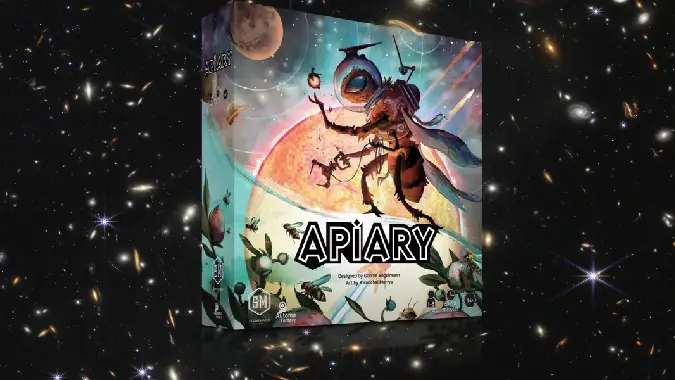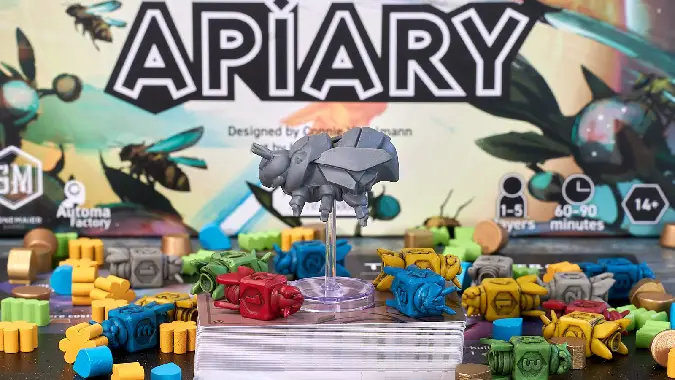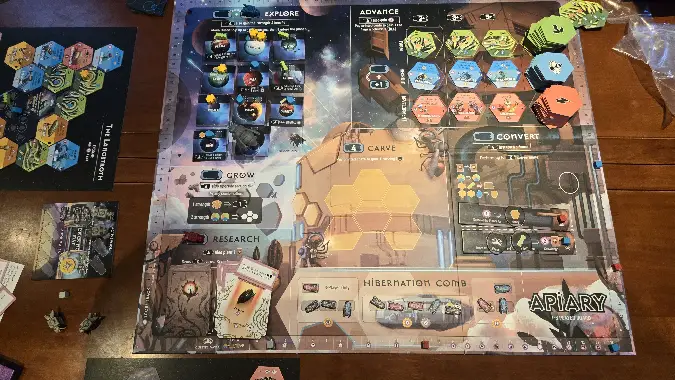The Apiary board game lets you play as Bees! In! Space!

Picture it: the distant future. Mankind is but a memory on the face of the Earth. In the vacuum they’ve left behind, the simple honeybee has evolved to fill the niche of supreme species. They call themselves the Mellifera now, and have learned much from the ruins of their forerunners. Grown in both size and intelligence, these industrious pollinators have taken to the stars to create a new legacy, one that you can guide in the board game Apiary.
Apiary is a worker-placement game for one to five players set in the depths of space. On each turn, you’ll allocate your not-so-little worker bees to explore planets, gather resources, expand your hive, and in general prove that your faction is the bee’s knees. Everyone starts out with a randomly-chosen hive with varying layouts and bonuses for placing expansion tiles. They also get a randomly-chosen faction tile to place on their hive, which determines their starting workers and resources, provides some starting resource storage, and grants a unique ability for that faction. From there, it’s up to the player to wisely allocate their workers and resources to maximize the glory of their hive, as measured in victory points, before they succumb to senescence (but more on that later).

Getting that sweet honey
Every turn, each player chooses to either place a worker from their hive on one of the available action spaces, or to reclaim all their workers from the board and collect income. There are six possible actions that a player can select on their turn, each with their own effects.
- Explore: Move the Queenship to a planet in your sector of space and collect resources from it, such as fiber, water, or pollen. If that planet hasn’t been explored yet, you get a bonus for charting it and get to decide what the resources it produces will be!
- Advance: Spend some of your resources to expand your hive. You can pick from Farms, which provide you with resource storage space and income options; Recruits, which provide ongoing bonuses to your faction; or Developments, which cost advanced resources but provide potent one-time benefits. The bigger your hive, the more victory points you stand to earn at the end of the game!
- Grow: Spend a little pollen to breed new workers, or other resources to purchase a hive frame, allowing your hive to grow beyond its initial limits. You might even be able to upgrade your starting faction’s special ability.
- Research: Draw a number of cards from the top of the seed deck and choose one of the drawn cards to keep. These cards can be played during your turn for resources or special effects. With the proper care, they can instead be planted for powerful end-of-game benefits.
- Convert: Take some of your basic resources and convert them into other types, or exchange a seed card you don’t like for one from the top of the deck. Alternately, you can combine some of your basic resources to earn more advanced resources: wax, or even precious honey.
- Carve: Construct a monument to your faction’s glory in your hive! These monuments grant valuable end-of-game victory points in a variety of ways, but they all cost precious honey to build. Unlike the expansion tiles you can get from the Advance action, there are precious few of these monuments to choose from, so make sure you snatch them up before your competitors do!
One nice thing about how Apiary handles its worker placement is that any action space can be played on, even if it’s already occupied. While in other games, you might be limited to only placing on unoccupied spaces, if another player’s worker is already on a space in Apiary, or even one of your own is hanging out there, you simply bump the previous worker out of the way and take its place. They go back to their hive and you can get on with your own acts of pollinating industry. It’s a nice quality of life decision that prevents players from feeling they need to take an action solely to prevent another player from doing so.

The quick and the hibernating
What sets Apiary apart from many other games of its genre, and in my opinion makes it more interesting, is that your workers are not static. As you send them out to perform tasks, your workers will age, with a rating from one to four. This isn’t a bad thing, either! Older workers are wiser and more effective at whatever you set them to do. They can explore deeper regions of space, or build more advanced structures in their hives, for example. Some tasks can only be accomplished by the most elder of workers. But after a certain point, your workers go from being advanced to being old and tired. (Like me!) After returning from a task when they’re age four, that worker will retire and go into hibernation, leaving the hive with a final parting gift from the board’s hibernation track. This hibernation mechanic forms the game’s overall clock; the game ends when any player has had seven workers go into hibernation, or once the hibernation track fills up with sleeping workers. It’s not a long clock, either!
Having played it a few times now, I find that I really enjoy Apiary. The aging mechanic provides a significant layer of depth to each player’s choices during their turns. You have to plan not just for which actions you’re going to take on your turn, but also which worker you’re going to take them with. Will your plan have workers of sufficient age to accomplish your goals when you need them? Do you risk sending one of your workers into premature hibernation, leaving you with a dearth of actions for the next turn? It’s a game of simple choices with complex interactions, and that is precisely my jam.
This has the pleasant side effect of making the game relatively easy to teach: a player has relatively few options for actions in any given turn, and while those options don’t change they still feel very rewarding when you make the right play at the right time.
Also, frankly, the game has an aesthetic that I just adore. What’s not to like about Bees! In! Space!? Apiary is published by Stonemaier Games, and is available for purchase at their store now.
Please consider supporting our Patreon!
Join the Discussion
Blizzard Watch is a safe space for all readers. By leaving comments on this site you agree to follow our commenting and community guidelines.




